by Dr Rick | May 9, 2020 | Agency
Read this:
Joe’s Story
Joe, had been unemployed for several years now. He didn’t have any disabilities-just 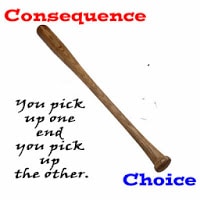
didn’t feel the need to work. Joe kept busy driving the children to dance, soccer, basketball, piano lessons etc etc. He was a counselor in the Elder’s Quorum presidency. His wife was working part-time at a local restaurant and attending counseling at LDS Family Services for depression. The bishop was paying for her counseling. They just had their 6th kid. She was breastfeeding so they qualified for WIC. They had an EBT payment card, like a credit card, so the WIC monies along with their SNAP, cash and food stamp benefits were automatically deposited onto their card for use at their convenience. The bishop and extended family from time-to-time also helped the family with money and food. Nevertheless, Joe’s family seemed to have all the necessities of life-cell phones, a place to live, etc etc
From the outside appearance, Joe’s family seemed to have everything their neighbors had next door -where the father worked two jobs and the wife worked part-time. (Satan and his Special Forces have successfully engineered our society to “temporarily” remove consequences from certain choices.)
Ask this:
Does Joe have “Agency?”
AGENCY HAS SEVERAL COMPONENTS
You thought “agency” just meant “choice.” But its much more…
Victor Ludlow says: “the seven essential elements of agency: identity, knowledge, freedom, action, law, efficacy, and preservation.” (Principles of Practices of the Gospel Restored, pg. 157).
LDS psychologist Allen E. Bergin in “Toward a Theory of Human Agency” wrote: “The concept of agency may be subdivided into numerous dimensions such as: The initiation of behavior or the originating of ideas. This may be termed the domain of creation. The processes of decision-making or choosing, that is, the domain of reason. The processes of self-regulation or the domain of will. These and related topics provide enough substance for several books.” (BYU Studies, vol. 16, 1975-1976).
Adam and Eve an example
God told Adam and Eve they had a “choice” (an essential element of agency). He followed up by saying they could freely eat of every tree in the garden except one, the tree of knowledge of good and evil. Of that tree God said, “thou shalt not eat of it, nevertheless, thou mayest choose for thyself, for it is given unto thee; but, remember that I forbid it, for in the day thou eatest thereof thou shalt surely die.” (Moses 3:17). After giving Adam and Eve choice he gave them “knowledge about consequences” of their choice a “choice between good and evil” (another essential element of agency). Finally, he held them accountable for the choice they made. You can read about the consequences for their choice in Genesis 3:16-17. It was here in the Garden of Eden God gave Adam and Eve “Agency” (Moses 7:32). Accountability was an essential element.
(The single best LDS source for agency can be found here: What the Church Teaches About Agency. )
I’m getting old so let’s keep “agency” plain and simple. Personal accountability consistently shows up in definitions of agency.
“Agency is…
to act with accountability and responsibility for our actions.”
Satan’s plan-DECREASING a person’s ACCOUNTABILITY
WILL DECREASE a person’s AGENCY
In addition to Accountability, I view Choice and Knowledge of Consequences as essential pieces of the “Agency Puzzle.”
Simple concept… Satan needs only to eliminate one of the puzzle pieces that makeup agency to remove one’s agency. Let’s take accountability for example, when Satan creates an environment in which a person’s accountability is minimized, agency is also minimized. The belief that I can have want I want without effort, something for nothing…. is sufficient to eliminate one’s agency-freedom to act.
HOW WE ARE DECEIVED
Deception comes into play again because Satan’s plan of removing accountability for our choices is theologically impossible and could not have worked even if all of the spirit offspring of God in the pre-existence had “voted” for it –
(A topic for another blog.)
Satan’s successful destruction of our agency isn’t
by force or with weapons of mass destruction but
by flattering us into believing there is NO personal accountability for our choices.
See blog: Satan Exposed
Of course Satan could never really destroy God’s gift of agency- That’s impossible. But he can deceive us…
….by convincing us self-reliance and personal accountability are not that big a deal and have nothing to do with agency.
….by having us focus only on our right to choose (Choice being one element of agency) a partial truth and not also emphasizing the consequence of the choice (Consequence being another element of agency).
etc etc
EXAMPLES OF “LOST” AGENCY
EXAMPLE 1-Seagulls starving to death
In this story seagulls lose their ability “to fish” by Marion G. Romney:
… In our friendly neighbor city of St. Augustine, great flocks of sea gulls are starving amid plenty. Fishing is still good, but the gulls don’t know how to fish. For generations they have depended on the shrimp fleet to toss them scraps from the nets. Now the fleet has moved. …
“The shrimpers had created a Welfare State for the … sea gulls. The big birds never bothered to learn how to fish for themselves and they never taught their children to fish. Instead they led their little ones to the shrimp nets.
“Now the sea gulls, …, are starving to death because they gave in to the ‘something for nothing’ lure! They sacrificed their independence (agency) for a hand-out.“A lot of people are like that, too. They see nothing wrong in picking delectable scraps from the tax nets of the U.S. Government’s ‘shrimp fleet.’ But what will happen when the Government runs out of goods? What about our children of generations to come? (The First Presidency Message; The Celestial Nature of Self-Reliance, Ensign June 1984)
These seagulls lost their agency to fish.
EXAMPLE 2-Stuck on an escalator
In this story, two people get stuck on a broken escalator and lose their ability to “get off“ on their own – shared by a popular YouTube video People Stuck On An Escalator.
These individuals stuck on the escalator have lost their agency to get off.
(How does being stuck on an escalator relate to addiction?)
EXAMPLE 3-Joe “…failing to provide…”
In this story above, “Joe” loses his ability to “provide the necessities of life” (The Family: A Proclamation to the World.) by depending on others to care for him and his family.
Joe, after years of unemployment and others taking care
of him, has lost his agency to provide for his family.
WHY IS THIS IMPORTANT?
If this is true-reduce personal accountability and you reduce agency-… some of us have lost or are in the process of losing our agency!
As in the war in the pre-existence, Satan’s political platform has once again successfully influenced millions to surrender their agency and follow him. (Even though they go to church every Sunday.)
In the examples above there is a reduction in personal accountability for decisions as a dependency on others increases. This process reduces one’s ability to choose and to do. (See: The Gift-Between God and I ; Counselitis)
Except for the starving seagulls who are now suffering
the consequences for personal choices.
CHALLENGE
Can you get off an escalator?
dr rick
by Dr Rick | May 8, 2020 | Codependence, Relationships
RELATIONSHIP WITH A NATIVE-AMERICAN
A few years ago the Feds called and asked if I would do a forensic evaluation on a young man on the Indian Reservation in Southern Utah. I said “Yes” of course. Then they asked if I had any Native-American Culture training. I said “Yes” of course. (I remembered taking a class back in graduate school.)
I drove to Southern Utah and began the interview with the young man. During the interview, he was always looking down making no eye contact. I interpreted his lack of eye contact as resistant and challenged him about this resistance. Well, things got worse as this young Native-American began to become more withdrawn during the interview.
Before the next interview I did a little homework and learned:
Most Native American people avoid prolonged direct eye contact as a sign of respect. It is also a simple matter of being courteous to keep one’s eyes cast downward.
Boy did I feel stupid!
If I wanted to develop a relationship with this Native-American I had to accept his relationship rule of having “no eye contact”-
– whether I liked it or not,
– whether I thought it was right or not, or
– whether it was psychologically healthy or not.
Believe it or not
ALL RELATIONSHIPS HAVE RULES.
Most are unwritten – But usually easily recognized. You want to get along better with your mother-in-law, your spouse, your child, your boss, or anyone else – best to learn and follow the Must-Follow Relationship Rules.
RELATIONSHIP WITH THE SAVIOR
Think about it.
Are there “rules” I need to comply with if I want a personal relationship with the Savior? God?
Of course! Paya tithe, read the scriptures, pray, etc. etc. In fact, James E. Faust identifies this as the world’s greatest need:
…‘What is the greatest need in the world?’ One wisely responded: ‘Is not the greatest need in all of the world for every person to have a personal, ongoing, daily, continuing relationship with the Savior?‘ Having such a relationship can unchain the divinity within us, and nothing can make a greater difference in our lives as we come to know and understand our divine relationship with God. (“A Personal Relationship with the Savior” General Conference, Oct 1976)
Wouldn’t it be tragic if you spent your whole earthly life being “religious” but never actually followed the Savior’s Must-Follow Relationship Rules – and on judgment day He says,
If you want to “get along with somebody“
FIRST: Identify their Must-Follow Relationship Rules.
SECOND: Follow those rules or expectations.
When you follow their relationship rules there will be LESS conflict.
THIRD: If you want to “change the relationship rules of somebody else“
(Sometimes, this is a good idea.)
Be prepared,
When you don’t follow their relationship rules there will be MORE conflict.
WHERE DO “RELATIONSHIP RULES” COME FROM?
It doesn’t matter.
Relationship rules can be a result of: core values, early childhood experiences, trauma, conscious decisions, mental illness; etc etc. The “Must-Follow Relationship Rules” principle still applies-if you want less conflict in a relationship.
SAMPLE RULES
Here are some samples of “negative relationship rules” as we look at a variety of different aspects of a relationship:
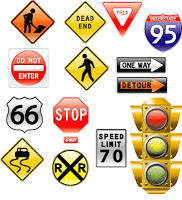 Privacy: Can’t keep anything private. Even when they promise not to tell, within hours everyone knows.
Privacy: Can’t keep anything private. Even when they promise not to tell, within hours everyone knows.
Resolving Conflict: Nothing ever gets resolved. No matter what you do or say. On the next visit it’s like you start all over again-from the beginning.
Communication: Never get a straight answer. No matter how clearly you ask the question.
Physical boundary: No touching. No kissing. No hugs.
Intimacy boundary: No talking about feelings. Never say “I love you.”
Honesty: Don’t tell the truth. Even if they ask.
etc etc
Of course there are “positive relationship rules” too. It doesn’t mean you always have to obey the rules. 🙂 But it does mean your relationship will be more conflict-free (not necessarily healthy) when you identify and follow the “Must-Follow” relationship rules.
CHALLENGE
Getaway from everything that runs by electricity (including a battery).
Sit.
Think.
Identify three “Must-Follow Relationship Rules” others must follow to maintain a relationship with YOU!
dr rick
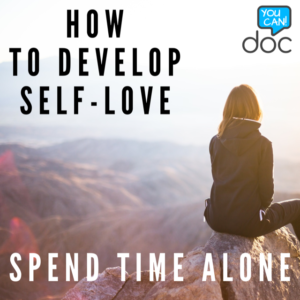
by Dr Rick | Apr 8, 2019 | Self-Love
You are responsible for your ability to love, but not for the outcome of another’s life. You can do everything right as a parent or spouse, but there is no guarantee your child or spouse will change.
A reminder why its important to develop “Self-Love” a healthy focus on self:
Jethro Teaching Moses
 If I have invested all my esteem, my love, my time and my effort in working out or worrying about someone else’s salvation, how much time and energy to I have left to work on me? In Exodus 18, the Lord teaches this principle to Moses. The story begins with Jethro, Moses’ father-in-law, bringing Moses’ wife and sons to meet him. While visiting Jethro, Moses’ father-in-law becomes aware of Moses’ Codependency,
If I have invested all my esteem, my love, my time and my effort in working out or worrying about someone else’s salvation, how much time and energy to I have left to work on me? In Exodus 18, the Lord teaches this principle to Moses. The story begins with Jethro, Moses’ father-in-law, bringing Moses’ wife and sons to meet him. While visiting Jethro, Moses’ father-in-law becomes aware of Moses’ Codependency,
And it came to pass on the morrow, that Moses sat to judge the people: and the people stood by Mosses from morning unto the evening. And when Moses’ father-in-law saw all that he did to the people he said, What is this thing that thou doest to the people? Why sittest thou thyself alone, and all the people stand by thee from morning unto eve? And Moses said unto his father-in-law, Because the people come unto me to inquire of God; When they have a matter they come unto me; and I judge between one and another, and I do make them know the statues of God and his laws. (Exodus 18:13-16).
One might wonder, “What is Jethro worried about? Isn’t Moses doing the Lord’s work from sun up to sun down? What more can one do? Surely God would approve of such behaviors?” Jethro, being inspired of the Lord, counsels Moses:
And Moses’ father-in-law said unto him, the thing that thou doest is not good. Thou wilt surely wear away, both thou, and this people that is with thee; for this thing is too heavy for thee; thou are not able to perform it thyself alone. (Exodus 18:17-18)
Jethro recognized that Moses would eventually “wear away” if he continued doing everything himself. Perhaps he might of ended up having a “nervous breakdown” and end up in a psychiatric ward. Jethro instructed Moses to appoint lesser judges and to delegate power to them. Then Jethro gave Moses a promise:
If thou shalt do this thing, and God command thee so, then thou shalt be able to endure, and all this people shall also go to their place in peace (Exodus 18:23)
For what shall it profit a man, if he shall gain the whole world, and lose his own soul? Mark 8:36
How Does One Develop Self-Love?
1. Spend Time Alone
One must take time to be alone to develop self-love. In Matthew 7:3, Jesus said: “And why beholdest thou the mote that is in the brother’s eye, but considereest not the beam that is in thin own eye?” Codependents must focus on the “beam” in their own lives before various strategies and interventions aimed toward “mote” in the addict’s life will be effective. Each of us needs to understand that our priority is to return to God and make the necessary changes in our life to do just that, In part, this is done by taking time to be alone. Each codependent must become sufficiently self-reliant to work out your personal salvation privately. If our personal “spirituality bucket” is empty what can we offer those around us who are in need of “living water?”
It is difficult to make time for ourselves in such a busy world. The needs of church, community, our children and our spouse can be demanding. In order to be alone, at times important tasks will have to be postponed or even left undone. Imagine the kinds of activities that might have been left undone by Moses when he went alone to Mount Sinai leaving the Israelites behind. If Moses had remained with the Israelites would they have begun worshiping idols? Using Christ as another example, might have someone benefitted from a blessing while Christ was in the desert alone for 40 days and nights? However inconvenient, these absences, (when individuals took time to be alone and with God) benefitted the entire human race in ways that can’t be measured.
Perhaps the best scriptural example illustrating the importance of being alone is found  in Matthew 14:13. Here disciples tell Jesus that John the Baptist has been beheaded “When Jesus heard of it, he departed thence by ship into desert place apart.” The people heard where Jesus was going and they followed him by the thousands. Jesus ministered unto the 5,000 “beside women and children” and fed them. After the miracle of feeding the onlookers, the scriptures tell us:
in Matthew 14:13. Here disciples tell Jesus that John the Baptist has been beheaded “When Jesus heard of it, he departed thence by ship into desert place apart.” The people heard where Jesus was going and they followed him by the thousands. Jesus ministered unto the 5,000 “beside women and children” and fed them. After the miracle of feeding the onlookers, the scriptures tell us:
And straightway Jesus constrained his disciples to get into a ship, and to go before him unto the other side, while he sent the multitudes away, he went up into the mountain apart to pray; and when the evening was come, he was there alone. (Matthew 14:22, 23).
For whatever reasons, after the death of John the Baptist Jesus arranged things to be alone.
For many codependents, the guilt associated with spending time alone and caring for themselves will make this assignment nearly impossible to complete. However, continue your efforts in hope. If time alone is spent effectively, someday you can find the “hidden treasure” YOU! You will become acquainted with your inner feelings, your aspirations, and the blessings promised you in your patriarchal blessing. God wants it this way. Only Satan would have you believe it is a sin to work out your own salvation.
2019 (C) Docyoucan
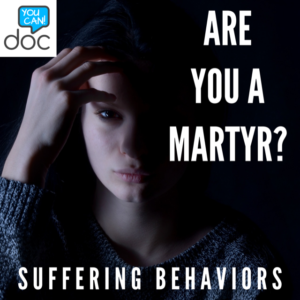
by Dr Rick | Apr 7, 2019 | Codependence
Check out:
Brief History of Codependence
How Do Normal Families Adjust To Addiction?
Rescuing Behaviors – First Responders
Persecuting Behaviors
Suffering behaviors are also known as being a “victim” or a “martyr.” Suffering behaviors typically occur after the codependent has tried everything. They have tried to rescue or enable the identified person without success. Next, they have tried to persecute – yell or control the identified person into change. Again with no success. So often they give up and suffer. A martyr willfully suffers in the name of love or duty.
Typical Suffering Behaviors Include:
Guilt
Typically, codependents ask themselves what they might have done to cause the identified person to have the problem (e.g. alcohol, viewing porn, anger) in the first place and how they might have prevented it. They might ask themselves, “What did we do wrong?” Often they review every detail of the identified person’s life. Many families who seek counsel report something like “We must have failed somewhere?” In a codependent’s thinking, one plus one is supposed to equal two. That is, if there is an addiction problem then there must be a parent or spouse problem. As a result, codepndents look and find reasons to feel guilty, regardless.
Is some cases, codependent parents may have indeed made some serious mistakes, and were abusive to their child, either physically or emotionally. Such behaviors certainly can predispose a person to substance abuse or some other problem. Often at this stage the codependent feels unworthy to maintain a church calling or even call upon God. They believe they are being justly punished for their sins by having a loved one suffer from an addiction or some other problem. Religious codpenendents not only carry the “oughts and shoulds” of their own making but also of their religious beliefs. Instead of “grace” they experience “guilt.”
Depression and Defeat
The end result of suffering behaviors is defeat. Nothing has worked. Prescription drug use and counseling might have been sought by the codependent to deal with the identified person. Withdraw from social activities, excessive worrying, and possible physical ailments begin to occur. Occasional thoughts of death may also exist. One good mother reported “I didn’t want to kill myself, but I often wished that my car might hit a telephone pole or something. I couldn’t stand the thought of my son being a drug addict and in prison.” Codependents acknowledge their powerlessness over their own lives and that of the addict. They experience in a personal way what Christ taught in Matthew 10:36: “And a man’s foes [enemies] shall be they of his own household.”
Loss of Personal Freedom
When a codependent feels responsible for how the identified person acts or feels, eventually they are led into bondage. As a codpendent assumes responsibility for the identified’s acts or feelings, the following occurs:
- You become subject to manipulation or control by the identified person.
- You eliminate yourself as a resource to the identified person.
- You tend to rescue the identified person.
- Your self-esteem goes down.
- You become depressed and experience mood swings based on the identified person’s behavior.
- You interfere with God’s great gift of agency and the law of justice.
- You are not free to act for yourself
I remember well the story, a parents of an adult drug addict still living at home. The father pulled a large set of keys out of his pocket. The father explained “Our son steals everything… we have to keep everything locked up…”
Ways to Tell If You Are Being a Martyr in Your Relationship
 You are angry and resentful because your relationship is disappointing to you. Often, you think that the main problem rests in your spouse’s behavior. In your opinion, your spouse or mate should be doing things differently, and this would solve everything.
You are angry and resentful because your relationship is disappointing to you. Often, you think that the main problem rests in your spouse’s behavior. In your opinion, your spouse or mate should be doing things differently, and this would solve everything.
You communicate with people who cannot make any changes. You may talk to friends, for example, rather than communicating directly with your spouse or mate.
You whine, scapegoat, complain, and may even describe yourself or see yourself as a victim. Although you may have endured some bad experiences in your relationship, you fail to own how you create, promote, or allow these outcomes.
You have a hard time owning your role in the problems that you discuss. Rather than saying, “Next time, I’m going to ___,” you stay stuck in what your partner should have done differently. If someone who you complain to offers a suggestion, your first reaction is to reject it. Following this, you might find that you rationalize or justify why you must continue to behave as you are.
The problem is chronic problem—it has endured more than three months. In addition, you see yourself as chronically unhappy in the relationship, and its deeper problems remain unsolved.
You begin to see yourself as a storyteller, moving from one negative story to the next. You may even find yourself rehearsing what you’ll tell friends and family or a therapist, coach, or preacher, rather than rehearsing strategies to actually correct the problems.
Underneath your anger and resentment, there may be depression and fear. These feelings tend to surface after the storm of your anger.
You may appear very capable to others, but you really see yourself as dependent upon your spouse or partner. This leads you to avoid asking for what you want directly, being assertive, getting help, or leaving the relationship.
You may behave as though you are trapped, even when some of your problems may have ready solutions. Trapped people often fluctuate between acting helpless and lashing out.
Are You A Relationship Martyr?
Co-dependency Mental Health America
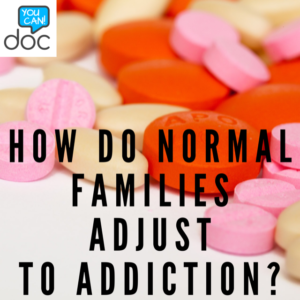
by Dr Rick | Mar 24, 2019 | Addiction, Codependence
Check out:
Brief History of Codependence
Rescuing Behaviors – First Responders
Persecuting Behaviors
Suffering Behaviors – Are You A Martyr?
Normal healthy families adjust to addiction and other’s in need, by developing predictable behaviors. These behaviors are typically referred to as “codependence.” Codpendent behaviors are viewed as dysfunctional. The most common codpendent behaviors include:
Rescuing Behaviors
Rescuing behaviors often protect the identified person from immediate consequences of their own irresponsible behavior and prevent growth from occuring. Surrounding loved-ones exhibit behaviors like denying, increased religious activities, coverying-up, and lying. Rescuing behaviors can be viewed as surrounding codependents trying to “fix” the identified person with “love” and “help.”
Persecuting Behaviors
As noted, the surrounding family members first try to love the identified person into “good” behavior by rescuing or enabling them. It doesn’t work. The rescuer gets fed up, angry and resentful with the person with the problem, and then turns to persecuting behaviors. A codependent’s typical reaction to a loved-one’s bad behavior are persecuting behaviors like: resentment, nagging, threatening, yelling, and blaming.
Suffering behaviors
Suffering behaviors are also known as being a “victim” or a “martyr.” Suffering behaviors typically occur after the codependent has tried everything. They have tried to rescue or enable the identified person without success. Next, they have tried to persecute – yell or control the identified person into change. Again with no success. So often the next step is to give up and suffer.Typical suffering behaviors include: guilt, loss of freedom, depression, and shame.
Here is a discussion with an addict, Bryn and his parents Cathy and Justin. In the discussion below drug addiction is the problem of concern. The same codependent behaviors occur with porn use, alcohol use, gambling, spending, etc.
(C) docyoucan 2019


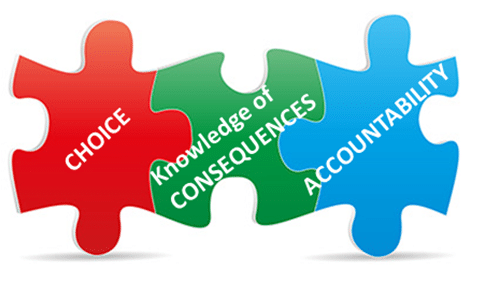


 If I have invested all my esteem, my love, my time and my effort in working out or worrying about someone else’s salvation, how much time and energy to I have left to work on me? In Exodus 18, the Lord teaches this principle to Moses. The story begins with Jethro, Moses’ father-in-law, bringing Moses’ wife and sons to meet him. While visiting Jethro, Moses’ father-in-law becomes aware of Moses’ Codependency,
If I have invested all my esteem, my love, my time and my effort in working out or worrying about someone else’s salvation, how much time and energy to I have left to work on me? In Exodus 18, the Lord teaches this principle to Moses. The story begins with Jethro, Moses’ father-in-law, bringing Moses’ wife and sons to meet him. While visiting Jethro, Moses’ father-in-law becomes aware of Moses’ Codependency, in Matthew 14:13. Here disciples tell Jesus that John the Baptist has been beheaded “When Jesus heard of it, he departed thence by ship into desert place apart.” The people heard where Jesus was going and they followed him by the thousands. Jesus ministered unto the 5,000 “beside women and children” and fed them. After the miracle of feeding the onlookers, the scriptures tell us:
in Matthew 14:13. Here disciples tell Jesus that John the Baptist has been beheaded “When Jesus heard of it, he departed thence by ship into desert place apart.” The people heard where Jesus was going and they followed him by the thousands. Jesus ministered unto the 5,000 “beside women and children” and fed them. After the miracle of feeding the onlookers, the scriptures tell us:
 You are angry and resentful because your relationship is disappointing to you. Often, you think that the main problem rests in your spouse’s behavior. In your opinion, your spouse or mate should be doing things differently, and this would solve everything.
You are angry and resentful because your relationship is disappointing to you. Often, you think that the main problem rests in your spouse’s behavior. In your opinion, your spouse or mate should be doing things differently, and this would solve everything.